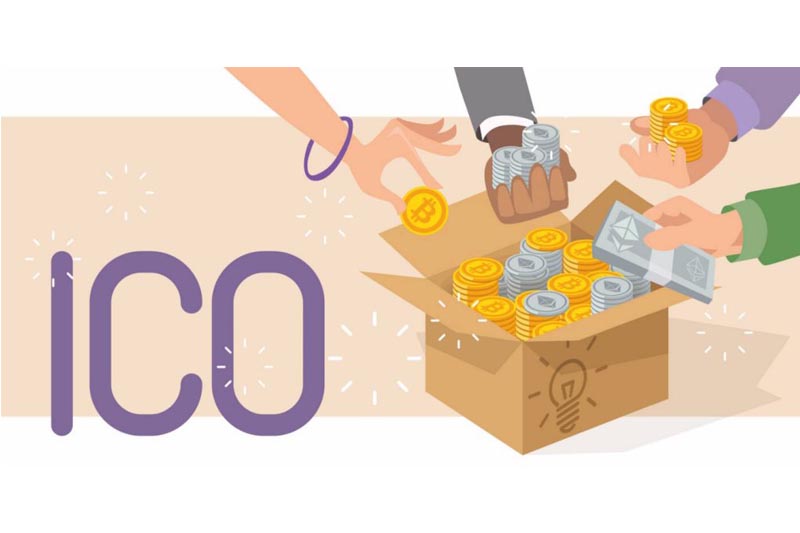£0.00

March 19, 2019
What is an ICO?
In the blockchain world, we use a host of terminologies that can be really confusing to outsiders. It’s like a random person watching Bloomberg or trying to follow the happenings in Wall Street. That would probably not understand half the things being said because it’s usually full of economic jargon.
One of such “jargon” in the blockchain industry is ICO. ICO is short for Initial Coin Offering. It is what most cryptocurrency exchanges do when starting out. Let’s take Ethereum as an example: When Ethereum started, they sold a total of 3700 BTC within 12 hours as ICO. This happened in 2014. As at that time, this figure summed up to about $2 million.

Let’s break it down
To make this clearer, you can think of ICO as equity crowdfunding most startups resort to in their initial foray into the market. Equity crowdfunding is the practice of getting people to give capital to kickstart or support a venture, with the expectation of returns if the company or venture yields profit.
Now using the above example, we can say Initial Coin Offering is the process of selling tokens to people with the expectation of returns if the cryptocurrency exchange system yields profit. In essence, rather than give money or capital as is the case in crowdsourcing, you get the coin equivalent of your financial contribution, in the hope that the coin increases tremendously in value.
What are the odds?
To be honest, there is about a little less than 50% chance that the next ICO funded project will succeed. However, if we’re still being honest, the same statistic goes for other forms of startups. A business that started today is more likely to fail than succeed. Therefore, we would not be fair if we pin the likelihood of failure solely on startups funded by ICOs.
Ethereum, by the way, started as an ICO (they raised $18 million in 2014 by selling 50 million Ether tokens), as did Ripple, Stellar, and some other now-prominent cryptocurrency tokens.
What do you stand to gain?
If all goes well, an ICO investment is a win-win situation; both for the entrepreneur and the investor. The startup owner can retain full ownership of the business regardless of how much money is paid in exchange for the coins. Likewise, the investor will benefit immensely as the coin’s value increases.
Are there any risks?
Of course; same as any other investment opportunity, there are risks associated with ICOs. They greatest among the risks involved is the possibility that the coin could decrease in value. Another popular issue is that of credibility of the sellers or startup owners. Not to worry, governments are creating guidelines and regulations to solve the problem of credibility.

In conclusion, you should know that the risks involved in investing in an ICO are the same as investing in other forms of startup. However, the benefits are quite different. If you invest in a non-blockchain startup, whatever returns you will et is tied to how much profit the business owners declare. On the other hand, investing in an ICO holds possibilities of massive returns that are not limited by the startups profit margin. They are only determined by the coin’s value.
Interested in launching your own ICO? Read “Should You Launch An ICO?” to learn what’s involved.

35 Comments
… [Trackback]
[…] Read More to that Topic: coinmercury.com/what-is-an-ico/ […]
… [Trackback]
[…] Read More on that Topic: coinmercury.com/what-is-an-ico/ […]
… [Trackback]
[…] Find More on that Topic: coinmercury.com/what-is-an-ico/ […]
… [Trackback]
[…] There you can find 44202 additional Information to that Topic: coinmercury.com/what-is-an-ico/ […]
… [Trackback]
[…] Info on that Topic: coinmercury.com/what-is-an-ico/ […]
… [Trackback]
[…] Info on that Topic: coinmercury.com/what-is-an-ico/ […]
… [Trackback]
[…] Find More here to that Topic: coinmercury.com/what-is-an-ico/ […]
… [Trackback]
[…] Read More Info here on that Topic: coinmercury.com/what-is-an-ico/ […]
… [Trackback]
[…] Here you can find 19723 additional Info on that Topic: coinmercury.com/what-is-an-ico/ […]
… [Trackback]
[…] There you will find 74687 additional Information on that Topic: coinmercury.com/what-is-an-ico/ […]
… [Trackback]
[…] Read More on to that Topic: coinmercury.com/what-is-an-ico/ […]
… [Trackback]
[…] Info on that Topic: coinmercury.com/what-is-an-ico/ […]
… [Trackback]
[…] Read More on that Topic: coinmercury.com/what-is-an-ico/ […]
… [Trackback]
[…] Information to that Topic: coinmercury.com/what-is-an-ico/ […]
… [Trackback]
[…] Read More Info here to that Topic: coinmercury.com/what-is-an-ico/ […]
… [Trackback]
[…] Information to that Topic: coinmercury.com/what-is-an-ico/ […]
… [Trackback]
[…] Read More on on that Topic: coinmercury.com/what-is-an-ico/ […]
… [Trackback]
[…] Here you will find 52883 more Information on that Topic: coinmercury.com/what-is-an-ico/ […]
… [Trackback]
[…] Here you can find 47625 additional Information on that Topic: coinmercury.com/what-is-an-ico/ […]
… [Trackback]
[…] Find More here to that Topic: coinmercury.com/what-is-an-ico/ […]
… [Trackback]
[…] Here you can find 61172 additional Info on that Topic: coinmercury.com/what-is-an-ico/ […]
… [Trackback]
[…] Read More Info here to that Topic: coinmercury.com/what-is-an-ico/ […]
… [Trackback]
[…] Info to that Topic: coinmercury.com/what-is-an-ico/ […]
… [Trackback]
[…] Read More Information here to that Topic: coinmercury.com/what-is-an-ico/ […]
… [Trackback]
[…] Find More on on that Topic: coinmercury.com/what-is-an-ico/ […]
… [Trackback]
[…] Here you can find 91648 more Info to that Topic: coinmercury.com/what-is-an-ico/ […]
… [Trackback]
[…] Read More here on that Topic: coinmercury.com/what-is-an-ico/ […]
… [Trackback]
[…] Read More Information here on that Topic: coinmercury.com/what-is-an-ico/ […]
… [Trackback]
[…] Read More here to that Topic: coinmercury.com/what-is-an-ico/ […]
… [Trackback]
[…] Info on that Topic: coinmercury.com/what-is-an-ico/ […]
… [Trackback]
[…] Read More here on that Topic: coinmercury.com/what-is-an-ico/ […]
… [Trackback]
[…] Info on that Topic: coinmercury.com/what-is-an-ico/ […]
… [Trackback]
[…] Find More on that Topic: coinmercury.com/what-is-an-ico/ […]
… [Trackback]
[…] Here you will find 98295 additional Information on that Topic: coinmercury.com/what-is-an-ico/ […]
… [Trackback]
[…] Info on that Topic: coinmercury.com/what-is-an-ico/ […]